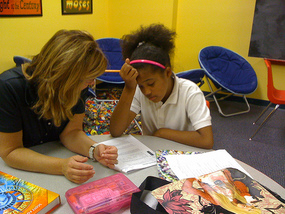Changing school environments and high-stakes testing have changed the field of education tremendously over the course of my career. An emphasis on learning styles and differentiation has fallen by the wayside as preparing for tests and meeting the standards have taken front stage.
The decision to hire a tutor may be a tricky one. As parents, we want the best possible educational opportunities for our children. As families, we struggle to find enough hours in the day to fit everything in. And frankly, we want to be sure that our children have a chance to simply be kids.
 Photo Credit: "IMG_0339", © 2009 Shana Stine, Flickr | CC-BY | via Wylio
Photo Credit: "IMG_0339", © 2009 Shana Stine, Flickr | CC-BY | via Wylio Our teachers are working hard and doing the best they can to meet each student where they are, but for students that learn differently, need extra time or practice to achieve mastery, or struggle with self-confidence, the current school climate may not be meeting all their needs. Reading support programs in schools are stretched thin and students typically receive lessons in small groups. Interventionists are often constrained to targeting isolated skills that are measurable by one minute tests. Students sometimes keep their head above water, but fail to develop solid phonological and decoding skills. As they move into reading material with more complex vocabulary and multisyllabic words, they suddenly find themselves having more and more difficulty keeping up. Many students don't qualify for extra help until they have fallen significantly behind their peers. And yet, studies have repeatedly shown the benefits of catching readers before they fall. The research is very clear. Students that are not reading at grade level by the end of third grade are at a significant disadvantage. They face higher drop-out rates, lower rates of post-secondary schooling, lower paying jobs and even poorer health.
Tutoring can provide your child with specialized skilled instruction to meet their individual needs and learning style. Rather than working solely on isolated skills, tutoring allows these skills to be framed in a context of developing as an overall reader and writer and building the habits and attitudes of a life-long learner. Teaching meets their needs and follows their learning pathway to ensure that they develop the skills they need to be successful in school and beyond.
One common thread I hear from my clients after a few weeks of tutoring is that they see a difference in the way their child feels about reading to them at home. The knowledge that they don't need to hide their weaknesses, because I am teaching them what they need to know and celebrating their successes with them, goes a long way toward building confidence that their child brings back to their classroom.




 RSS Feed
RSS Feed